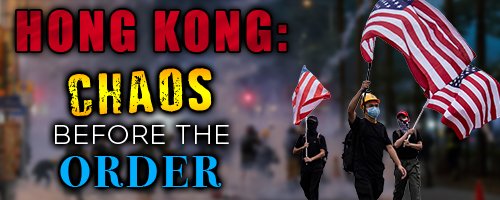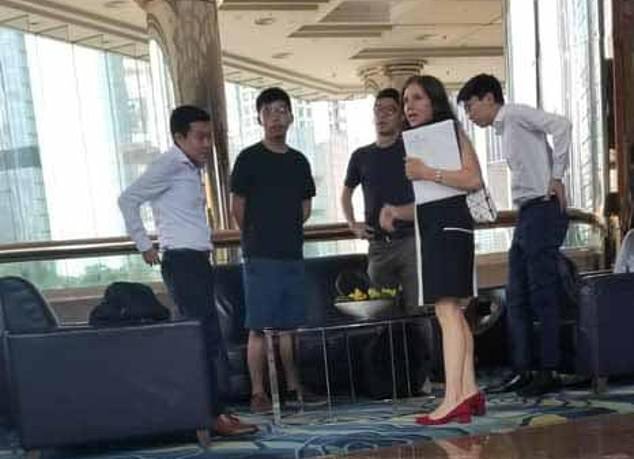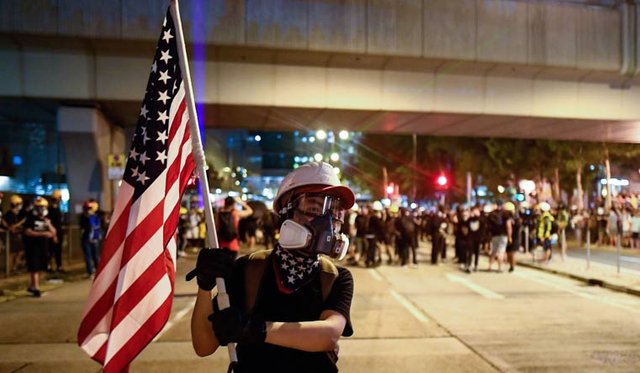Hong Kong: Chaos Before the Order
by James Corbett
corbettreport.com
August 17, 2019
When Fox News talking head Kathleen "KT" McFarland had ex-Reagan stooge Michael Pillsbury on her "Defcon 3" web show in 2014 to discuss the so-called Umbrella Movement protests which were then raging across Hong Kong, she got more than she bargained for.
Noting that "Chinese state-owned media" were alleging that the protests were "all the fault of the Americans," she asked Pillsbury point blank: "So what do you think? It's all the Americans' fault?"
Obviously, she was expecting a simple "no." Instead, Pillsbury told her: "It's not all our fault, but we're partially involved. We have a large consulate there that's in charge of taking care of the Hong Kong Policy Act passed by congress to ensure democracy in Hong Kong. We also have funded millions of dollars of programs through the National Endowment for Democracy to help democracy in Hong Kong. So in that sense the Chinese accusation is not totally false."
Like an old propaganda master, McFarland ignored that inconvenient answer and plowed ahead with her questions as prepared (including one that began "My former boss, Henry Kissinger, and I know he's a friend of yours as well. . ."). Regardless, the ugly truth did peek out from behind the slickly-packaged "news" propaganda, if only for a moment, and there was no putting the toothpaste back in the tube.
Five years old now, that exchange has resurfaced in the wake of the latest round of protests in Hong Kong to underscore the point that Uncle Sam does have his fingers in the HK pie and is still manipulating events there. The latest indication of US interference in HK is the brouhaha caused by US diplomat Julie Eadah, who was caught meeting with some of the protest movement's leading activists in a picture that made the rounds on Chinese social media.
The picures caused a stir, with China "summon[ing] senior officials from the US consulate general in Hong Kong and lodg[ing] stern representations over the contact between US consulate officials and Hong Kong secessionist forces." The US response? You're a bunch of thugs for daring to talk about the picture!
But all of this tit-for-tat raises a string of questions: What is America's role in the current Hong Kong protest movement? Does Washington's involvement in the protests de-legitimize the movement itself? And where does that leave us, looking from the outside in at a situation like this?
To answer the first question, we need to unpack Pillsbury's answer to MacFarland five years ago.
First of all, he mentions the "Hong Kong Policy Act passed by congress to ensure democracy in Hong Kong." So what is the Hong Kong Policy Act, anyway? It's an act of congress passed in 1992 that commits the US to "Support for democratization" in Hong Kong. Specifically, "whenever the President determines that Hong Kong is not sufficiently autonomous to justify treatment under a particular law of the United States, or any provision thereof, different from that accorded the People's Republic of China" the act authorizes him to suspend all treaties or agreements pertaining to Hong Kong. In reality, this means that the US could effectively neutralize Hong Kong, which currently serves as China's financial lifeline to the rest of the world and its primary method of accessing foreign investment, by cutting it off from America (and, by implication, the financial world in general).
Pillsbury also pointed out that "pro-democracy" groups in Hong Kong have received millions of dollars in funding from the National Endowment for Democracy (NED). The NED should be familiar to those who have seen my reporting on how "NGOs are the Deep State's Trojan Horses." Suffice it to say, the endowment serves as a thinly-disguised cover for CIA subversion operations in any number of countries on the State Department hit list, from Nicaragua in 1990 to the Orange Revolution in Ukraine a decade ago and just about every other so-called "color revolution" that has sprung up in recent years. Time and again, the State Department signals the need for a regime change in a given target state (always in the name of "freedom" and "democracy," of course) and the people "spontaneously" rise up to oblige . . . with millions of dollars in NED funding to smooth the path.
The Hong Kong situation is no exception. Even the NED's official website openly lists the hundreds of thousands of dollars in funding that they provided to euphemistically named "human rights" institutions in the region last year, from the "Solidarity Center" to the "National Democratic Institute for International Affairs" and the "Hong Kong Justice Center." And that's just the funds they admit to granting in 2018. Over the last several years, the NED has, as Pillsbury notes, granted millions of dollars to such groups.
But beyond all this monetary support and the reports of anonymous "strangers" supplying the protesters with gas masks, helmets and other equipment, is there any evidence of foreign involvement in this spontaneous people's uprising? (Besides the photos of the US diplomat meeting with the protest leaders, that is.) I mean, it's not like these loyal and patriotic Hong Kongers are going around waving the stars and stripes while decrying outside interference from China, are they?
Oh, right. Of course they are.
But then, what of our second question? Even given that there is foreign interference in the protests, does that thereby de-legitimize the movement or its concerns? Should Hong Kongers shut up and be happy about Beijing's encroachment on their "Special Administrative Region" simply because Uncle Sam is looking to stir up trouble in China? Do freedom protesters have to do a 4D chess calculation about whether or not the US State Department is using their movement in a proxy war against America's enemies before deciding whether or not they should stand up for their freedom?
This is an issue I've broached a few times on The Corbett Report now, because I think it's a trap that those of us watching the machinations of the American Empire can fall into. It seems straightforward: If Washington is paying to stir things up in a given area, then the protests are all fake and the freedom movement in that area is not a "real" freedom movement. But this is too binary and simplistic. The people of Hong Kong have real and legitimate grievances with the Chinese government and real worries about their future. The right of the people to self-determination is a real and powerful motivating force there just as it is anywhere else, and who are we to tell the people of Hong Kong that their wish for freedom is illegitimate?
Something that should give pause for thought to those who would write off such protests as nothing more than American deep state operations is that when you dehumanize the protesters and disallow the legitimacy of their movement, you inevitably find yourself in the awkward position of cheering on the jackbooted thugs of the police state who are there to quell the protests. Yes, as many in the independent media have pointed out, the protesters have engaged in acts of violence during these protests, and that is despicable and should be condemned. But the police (who, interestingly, are dressing themselves up as protesters and mingling in with the crowds, Montebello-style), are also using brutal violence against protesters, and to ignore or deny that reality is dishonest.
So that brings us to our next question: Where does all of this leave us, looking on at a situation like this? The question itself is a trick. It presupposes that we have a role of some sort to play in these protests. That non-Hong Kongers should be actively choosing sides, rooting for, and even "aiding" one side or another in this conflict. But that's precisely the problem, isn't it? If it's outside interference that is stirring all of this discontent up in the first place, as some in the independent media would have you believe, then is more outside interference really the answer here?
In fact, as usual, the violence and conflict taking place in Hong Kong right now is playing directly into the hands of those who want to come in and impose "order" in the region. The protests obviously give Beijing the excuse to line their army up at the border and threaten to do away with the fig leaf of Hong Kong's quasi-sovereignty altogether. At the same time, any such crackdown would be exactly the excuse that the US and its partners in international crime would need to escalate their Clash of Civilizations 2.0 with the dreaded Chinese bogeyman.
One thing is for certain: the fight for the future of Hong Kong is raging as we speak. But the real question is: who is fighting that fight? The people of Hong Kong, or Beijing and Washington? The answer to that question will determine whether Hong Kong ever achieves a modicum of freedom, or whether it is destined to forever be a plaything in a proxy wars between the great powers.



No government is ever "de-legitimized"; government is slavery.
Slavery is unlawful and can never be legitimate.
James, you've avoided the real question(s) in this post, beginning with "Was Plato correct in stating that the greatest evil was ignorance, defined by willfully rejecting and/or disregarding truth."
As above so below, as below so above. Geography is not a comfort zone for aversion(s) to real freedom. Your "modicum of freedom" paradigm is cognitive dissonance. Please stop diminishing freedom. Please stop disregarding slavery.
Anything but freedom is a mushroom cloud.
Woodchuck Pirate
aka Raymond J Raupers Jr USA
woodchuckpirate.com